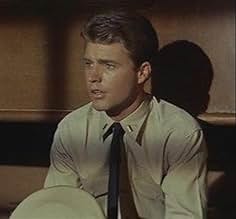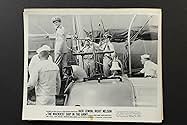Adicionar um enredo no seu idiomaDuring WW2, Lt. Rip Crandall, who was a yachtsman before the war, takes command of the USS Echo, a sailing ship, for a secret mission in waters patrolled by Japanese warships.During WW2, Lt. Rip Crandall, who was a yachtsman before the war, takes command of the USS Echo, a sailing ship, for a secret mission in waters patrolled by Japanese warships.During WW2, Lt. Rip Crandall, who was a yachtsman before the war, takes command of the USS Echo, a sailing ship, for a secret mission in waters patrolled by Japanese warships.
- Direção
- Roteiristas
- Artistas
- Cameo
- (as Joe Gallison)
- Crewman
- (não creditado)
- Sailor
- (não creditado)
- Crewman
- (não creditado)
- Chief Petty Officer
- (não creditado)
Avaliações em destaque
The WWII storyline based on true events couldn't be simpler. An American naval officer/ex-yachtsman Lt Rip Crandall (Jack Lemmon), and a young Ensign Tommy Hansen (Ricky Nelson), are ordered to sail an old sloop, the "USS Echo", with an unexperienced crew across the Great Barrier Reef to Port Moresby, where (although Crandall doesn't know until later) the boat is to be used to convey an Aussie coast-watcher to his destination, with a different crew. Crandall doesn't like the change-over so steals the mission. End of plot...almost.
The only real down side of this movie was the awful "Austroylian" accent of Irish actress Patricia Driscoll. Almost as bad as Dick van Dyke's Cockney accent in "Mary Poppins". Almost, but not quite. Although lovely to look at, it's a blessing Patricia only had a minor role. However I find it strange that the part couldn't have been given to a genuine Aussie.
All in all, I always found this movie very entertaining, and strangely enough, for a war film, and rather like "Mr Roberts", no violence worth worrying about. Which rather pleases me now, for my grandkids love it.
Columbia Pictures acquired the rights to a story in the July 1956 issue of Argosy titled Big Fella Wash Wash, inspired by reminisces from former Echo skipper Meredith "Rip" Riddle. The story was advertised on the cover of the magazine as "The Wackiest Ship in the Army", because the naval vessel had been under Army command while in port, and Columbia used that title when purchasing the story in 1957. The movie never explained any connection between the ship and the Army, puzzling some viewers.
Oddly enough, it never occurred to me that "Army" was strange, since I think of "army" as a general term for the military as well as the specific branch. But yeah, I can see how that might be confusing... now I feel foolish I had not noticed sooner.
Jack Lemmon plays a naval lieutenant who in civilian life had sailboat racing experience. Therefore he's just the man to command a sailing craft made up to look like a native trading vessel. The object being to land Australian coast watcher Chips Rafferty in the middle of Japanese held territory.
Lemmon has a callow young ensign as his executive officer in Ricky Nelson and a crew of men, none of whom have any kind of experience in a sailing craft. The laughs come as he tries to whip this crew into some kind of shape before the mission.
Jack Lemmon had just come off Some Like It Hot and The Apartment so he was hot box office back then. The Wackiest Ship in the Army isn't in the aforementioned league of films, but it's still good and unlike the other classics was turned into a television series, albeit a short lived one, just like that other Lemmon film, Mister Roberts.
Ricky Nelson was never the greatest actor going, but he was their for the teenage girl market at the box office. What he was though was a very good singer and he does get to sing Do You Know What It Means to Leave New Orleans which sold a few platters back in the day.
Outstanding other performances in the film are from Chips Rafferty, Australia's greatest cinema star, Mike Kellin playing the CPO of the sailing crew and Tom Tully who seems to continue where he took off from in The Caine Mutiny.
Even today I think cinema fans will enjoy the comedy of Jack Lemmon in The Wackiest Ship in the Army.
Jack Lemmon is excellent here in a sort of Ensign Pulver sequel. Ricky Nelson, 20 years old (strongly resembling the young Mel Gibson) is pretty good. Nelson was at the height of his fame in 1960, with a multimedia thing going on, consisting of his daddy's TV show, movies, and, most prominently, hit records. (The man had 17 Top Ten hits in his career!)
There's a gritty authenticity to the picture - for example, the sailors sweat a LOT just like they did in the South Pacific during the war. The grit combines with some laughs; this combination works well. (See "Father Goose" and "Mr. Roberts" for additional examples of this genre, drama/comedy-during-WWII.) Mike Kellin is very effective as the chief petty officer. Tom Tully is solid and subtle as the port captain - Tully suffered a tragic fate a few years later, see his listing here at IMDb for the sad details.
"Wackiest Ship" kind of falls apart toward the end when Jack Lemmon isn't around as much; it might have benefited from a few more minutes of Tom Tully. But on the whole it's 99 minutes well spent (it seems a little too short).
Lemmon made his first big film in 1955 when he played the con artist, Ensign Pulver, in "Mister Roberts," a movie that's attained classic status. In this 1961 film he dons the navy uniform again, this time as a lieutenant (senior grade). A reserve officer who was a dapper yachtsman in California before the war, Lemmon is assigned to command a sailing vessel with (barely functioning) auxiliary mechanical propulsion.
The U.S.S. Echo is hardly the dream command of any officer, reserve or regular. But the new C.O. gamely takes on training an eager but totally bemused crew in the art of sailing a vessel.
The Echo is assigned to land an Australian coast watcher on an island occupied by the stereotypically portrayed Japanese (more Japanese officers with U.C.L.A. degrees appear in film than ever showed up on the front). The heroic coast watchers were very important during the island hopping campaign and they deserve every bit of cinematic recognition they have received. Many died, some after being tortured by their captors.
Nowhere nearly as smoothly directed as "Mister Roberts," "The Wackiest Ship in the Army" (and there's no rational reason for the title-the Army doesn't even play a role here) teeters unevenly between some nice comedy and some very 1950s-1960s war action supplemented by combat footage (one Japanese plane has been shown blown out of the sky so often in movies that if the pilot's estate was entitled to royalties the heirs would be richer than Bill Gates).
The exploits of the Echo's crew led, we are told, to the American victory in the Battle of the Bismarck Sea, an important engagement.
This is a good film for renting. Jack Lemmon plays the competent and caring C.O. very nicely and is the center of the story.
The Navy must have really liked the script. They put a fleet anchorage at the filmmaker's disposal. Here's a quiz for the sharp-eyed. At one point the stern of one of the most famous and important smaller combatant vessels of World War II is shown while Lemmon is instructing his crew. What ship is it?
6/10.
Você sabia?
- CuriosidadesThe original name of the boat in the movie was the "Fiesta". She was built in Hong Kong in 1932 entirely of teakwood. She was a 72 foot gaff-rigged schooner and came with a 165hp auxiliary diesel engine, weighed 28 net tons, drew 8 feet of water and could make 7.5 knots under power. She was also equipped with 3 tiled heads (bathrooms), two of them with showers, 1400 gallon fresh water tank, a 19 cubic foot deep freezer, and a 24 cubic foot refrigerator. Prior to the movie the Fiesta was owned by Martin J. Vitousek and his wife the former Beatrice Leiseder. (Source: The San Francisco Chronicle Sept. 14, 1952).
- Erros de gravaçãoThe aircraft that flies Lt. Crandall (Lemmon) from the carrier to his new assignment on the Echo appears to be an S-2 Tracker or its variant, the C-1 Trader. Both planes first saw service in the mid 1950s, several years after the time frame of the movie.
- Citações
Lt. Rip Crandall: [the crew is abandoning ship] What, aren't you going to stay here and die for the "Rising Sun"?
Capt. Shigetsu: Are you out of your mind?
[Jumps overboard with the rest of the crew]
- Cenas durante ou pós-créditosOpening credits: THE WACKIEST SHIP IN THE ARMY...................IN THE ARMY?
- ConexõesFeatures Cabeça de Praia (1954)
- Trilhas sonorasDo You Know What it Means to Miss New Orleans
(uncredited)
Music by Louis Alter
Lyrics by Edgar De Lange
Performed by Ricky Nelson
[Hanson sings the song in the officers' club]
Principais escolhas
- How long is The Wackiest Ship in the Army?Fornecido pela Alexa
Detalhes
Bilheteria
- Faturamento bruto mundial
- US$ 1.236
- Tempo de duração1 hora 39 minutos
- Cor
- Proporção
- 2.35 : 1



































